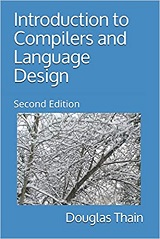
|
FreeComputerBooks.com
Links to Free Computer, Mathematics, Technical Books all over the World
|
|
- Title: Introduction to Compilers and Language Design
- Author(s) Douglas Thain
- Publisher: Independently published (June 18, 2020); eBook (Free Edition, 2023)
- Permission: "This is a free online textbook: you are welcome to access the chapter PDFs directly below. If you prefer to hold a real book, you can also purchase a hardcover or paperback below."
- Paperback: 247 pages
- eBook: PDF (247 pages) and PDF Files
- Language: English
- ISBN-10/ASIN: B08BFWKRJH
- ISBN-13: 979-8655180260
- Share This:

|
A compiler translates a program written in a high level language into a program written in a lower level language. For students of computer science, building a compiler from scratch is a rite of passage: a challenging and fun project that offers insight into many different aspects of computer science, some deeply theoretical, and others highly practical.
This book offers a one semester introduction into compiler construction, enabling the reader to build a simple compiler that accepts a C-like language and translates it into working X86 or ARM assembly language. It is most suitable for undergraduate students who have some experience programming in C, and have taken courses in data structures and computer architecture.
About the Authors- Douglas Thain is a Professor and Associate Chair, Computer Science and Engineering, University of Notre Dame.
 Similar Books:
Similar Books:
-
 Essentials of Compilation: An Incremental Approach in Python
Essentials of Compilation: An Incremental Approach in Python
A hands-on approach to understanding and building compilers using Python. Explains the essential concepts, algorithms, and data structures that underlie modern compilers and lays the groundwork for future study of advanced topics.
-
 Programming Languages: Application and Interpretation
Programming Languages: Application and Interpretation
This book unites two approaches to teaching programming languages, one based on a survey of languages and the other on writing definitional interpreters. The main programming language used in this book is Racket.
-
 Compiler Design: Theory, Tools, and Examples (Seth Bergmann)
Compiler Design: Theory, Tools, and Examples (Seth Bergmann)
This is an introductory level text for compiler design courses, that emphasizes problem solving skills. The concepts are clearly presented with sampler problems and diagrams to illustrate the concepts.
-
 Basics of Compiler Design (Torben Mogensen)
Basics of Compiler Design (Torben Mogensen)
This book presents techniques for making realistic, though non-optimizing compilers for simple programming languages using methods that are close to those used in 'real' compilers, albeit slightly simplified in places for presentation purposes.
-
 Compiler Construction (William M. Waite, et al)
Compiler Construction (William M. Waite, et al)
This is a modern text written by two leaders in the field. It demonstrates how a compiler is built, and provides the reader with a firm theoretical basis for compiler construction and sound engineering principles.
-
 Implementing Programming Languages: Compilers and Interpreters
Implementing Programming Languages: Compilers and Interpreters
This book follows a theory-based practical approach, where theoretical models serve as blueprint for actual coding. The reader is guided to build compilers and interpreters in a well-understood and scalable way.
-
 Compiler Design in C (Allen I. Holub)
Compiler Design in C (Allen I. Holub)
It teaches real-world compiler design concepts and implementation, with the basics of compiler design, concentrating on the second pass (in a typical four-pass compiler), consisting of a lexical analyzer, parser, and a code generator, etc.





